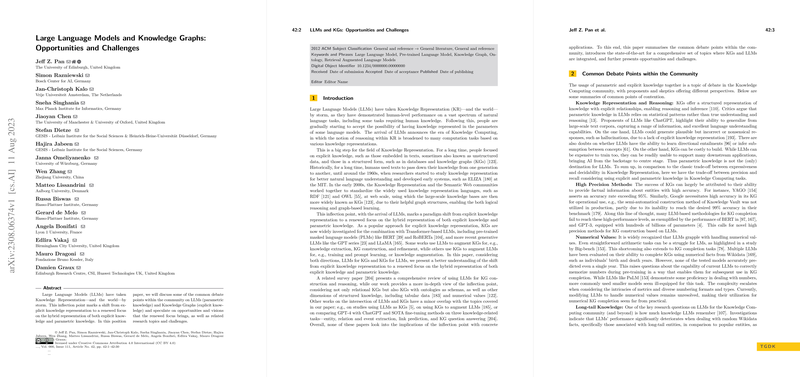Introduction
The integration of LLMs with Knowledge Graphs (KGs) is transforming the landscape of Knowledge Representation (KR) and artificial intelligence. LLMs showcase exceptional performance in a breadth of language tasks, raising discussions around the potential of representing knowledge through these models' parameters. This hybrid approach to knowledge representation promises to broaden the traditional KR concepts, previously centered on explicit knowledge like text and structured databases. The collaboration between LLMs and KGs introduces exciting opportunities but also presents considerable challenges that this paper scrutinizes in detail.
Hybrid Knowledge Representation
Traditionally, knowledge has been passed down in textual form or housed in databases and KGs featuring structured data. LLMs offer a paradigm shift, presenting a unified representation that combines explicit knowledge and parametric knowledge. This paper explores how KGs and Transformer-based LLMs, such as BERT and the GPT series, are being investigated in tandem. With KGs utilized for tasks such as knowledge extraction and LLMs for their representational capabilities, there is a deeper understanding of the shift towards this hybrid representation model. Additionally, significant advancements have been contributed by methods using LLMs to augment KGs in areas like knowledge extraction and KG construction.
Debating LLM and KG Integration
Within the Knowledge Computing community, the usage of parametric and explicit knowledge is hotly debated. Issues such as the reasoning capabilities of KGs with their structured representations versus the pattern-based knowledge of LLMs form the core of these discussions. There's also a focus on high-precision methods for KG construction, given the stringent accuracy requirements in applications like Google's Knowledge Graph. Furthermore, LLMs struggle with processing numerical values, which poses issues in KG completion tasks that involve numerical data. A critical research question revolves around how much knowledge LLMs can effectively memorize, especially regarding less common or 'long-tail' entities.
Opportunities and Challenges
With the emergence of parametric knowledge, new opportunities arise. For instance, LLMs provide instant access to vast text corpora and can enhance many subtasks within the knowledge engineering pipeline. They also allow for more advanced language understanding and the potential to compress and consolidate knowledge, which is a vital step in traditional knowledge engineering. Looking forward, the vision includes using LLMs to simplify steps in the knowledge engineering pipeline and combining KGs and LLMs to increase reliability in LLM usage. As research continues, key topics include KGs' role in enhancing pre-trained LLMs, prompt construction, and retrieval augmented methods.
